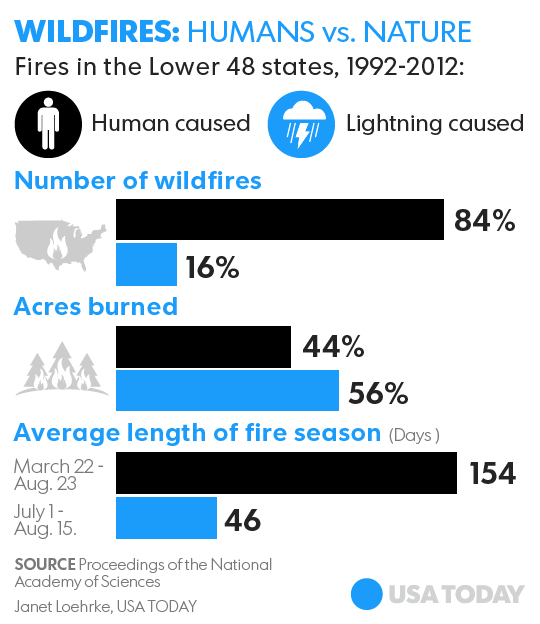Study: People start 84% of U.S. wildfires
The horrific wildfire that scorched Gatlinburg, Tenn., last November, killing 14 people, was human-caused — and that's not unusual: Whether deliberate or accidental, a whopping 84% of all wildfires in the U.S. are started by people, says a new study.

The remaining 16% are started naturally, by lightning, according to the report, one of the most comprehensive fire studies to date.
The study also found that humans have added almost three months to the national fire season on average. “Thanks to people, the wildfire season is almost year-round,” said study lead author Jennifer Balch of the University of Colorado. Humans also account for nearly half the acreage burned each year.
Balch and her study co-authors looked at 1.5 million wildfires from 1992 to 2012 and found that the human-ignited fire season was three times longer than the lightning-ignited fire season and also added an average of 40,000 wildfires per year.
"Fires are burning earlier in the spring in the Southeast and later in the fall in the West," Balch said. Fighting wildfires in the U.S. has exceeded $2 billion in recent years, the study said.
"To our knowledge, this is the most comprehensive assessment of the role of human-started wildfires across the United States over the past two decades," the authors said in the study.
"Although considerable fire research in the United States has rightly focused on increased fire activity (larger fires and more area burned) because of climate change, we demonstrate that the expanded fire niche as a result of human-related ignitions is equally profound," the study said.

A series of catastrophic, deadly, expensive and massive fires has scorched the western U.S. over the past decade. Several states, such as Washington, Oregon, Colorado and California have seen some of their largest wildfires ever recorded.
The wildfires in the study were ones that required firefighters to suppress them, not ones that were allowed to burn in remote areas.
Thomas Swetnam of the University of Arizona, who was not involved in this research, called the report a "very well done study. We have known for a long time that fires set by people are an extremely important factor in wildfire problems, but this study shows in detail how important people are in lengthening the fire season and contributing to increasing numbers of large wildfires," he said.
It's not that people are becoming more careless about fire or that more arson is occurring, Swetnam said. He said that lightning-caused fires are also increasing in the West because of warming temperatures, earlier springs and increasing droughts, which mean "that climate change is still a primary driver of the trends in this region."

The most common day for human-started fire by far was July 4th: There were 7,762 total wildfires started on that day over the course of the 21-year period in the study. Of the human-started wildfires with a known cause, the top five reasons are: debris burning (29%), arson (21%), equipment use (11%), campfires (5%) and children (5%), Balch said.
And what about Smokey Bear's indelible message that "only you can prevent forest fires?" She said the widespread policy to stop all fires was "a 100-year experiment that failed."
She said we should be starting the "right kind of fires," saying that it's better to proactively start smaller fires than to react to huge ones when it's an emergency.
"People are living in flammable landscapes," Balch said, noting how more houses are being built on the edge of forests, the so-called "wildland-urban interface," especially in the West.
The study appeared in the peer-reviewed journal Proceedings of the National Academy of Sciences.